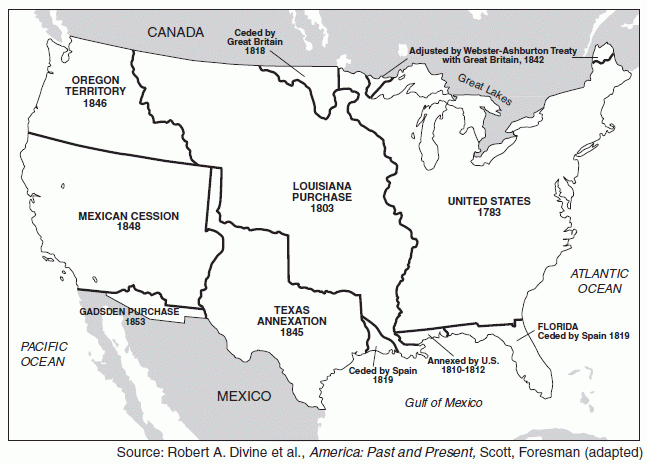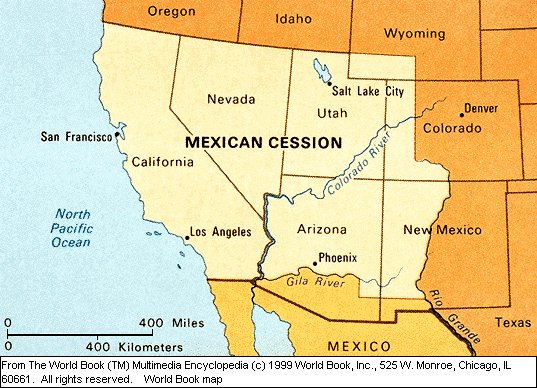Manifest Destiny and Expansion

M.A.P out Expansion West

Manifest Destiny, the belief that the United States is divinely inspired to spread across the continent, becomes the rationale for widespread territorial expansion. Critics repudiate it as nothing short of unbridled imperialism
1763 (Ignored proclamations)
1803 (Loose interpretations)
1819 (Diplomatic negotiations)
1820 (Representative implications?)
1836-1845 (Annexation complications)
1846 (Boundary negotiations?)
1848 (Mexican Cession)
1854 (Gadsden Purchase); Strategic Acquistion

Manipulating the Maine Maps - The Webster-Ashburton Treaty (1842)
In 1842, the British wanted to build a road westward from the seaport of Halifax to Quebec, running through disputed territory. The London sent Lord Ashburton to Washington to settle the dispute. He and Daniel Webster negotiated and gave the Americans 7,000mi of the 12,000mi of land in dispute.

Oregon Fever Populates Oregon “Fifty-Four Forty Or Fight!” (1844-1846)
Four nations claimed Oregon Country at one time: Spain, Russia, Britain, and the United States. Spain dropped out of America with the Florida Treaty of 1819 and Russia dropped out with the treaties of 1824 and 1825.
Britain controlled the portion north of the Columbia River. By 1846, about 5,000 Americans settled south of the Columbia River. The British had a lesser population but it did not want to give up its claims to the Columbia River. The disputed territory in Oregon Country became an issue in the election of 1844.
By the terms of the Oregon Treaty (1846), a compromise solution was reached. The current U.S.-Canada Boundary east of the Rockies (49’) Was extended westward to the Pacific Ocean, thus securing Puget Sound.
Some northern Democrats were angered and felt betrayed by Polk’s failure to insist on all of Oregon, but the Senate readily accepted the treaty

The Texas Declaration of Independence was signed by members of the Convention of 1836. Mexico still considered Texas as a province in revolt and refused to recognize Texas's independence. Mexico threatened war if the America protected Texas. TIMELINE OF TEXAS

Sam Houston immediately asked the U.S. government for recognition and annexation, but President Andrew Jackson feared the revival of the slavery issue, as the new state would come in on the slave holding side of the political balance. He also feared war with Mexico and so did nothing.
When Jackson’s successor, President Martin Van Buren also did nothing, Texas sought foreign recognition and support, which European nations eagerly provided, hoping to create a counterbalance to rising American power and influence in the Southwest. France and Britain quickly concluded trade agreements with the Texans.
The Lone Star of Texas Shines Alone - The Annexation of Texas (1845)
Texas became a leading issue in the presidential campaign of 1844. The Democrats were pro-expansion and were for annexing Texas. President Tyler signed a resolution in 1845 that invited Texas to become the 28th state in America.
Misunderstandings with Mexico = American Blood on American Soil
= Mexican War (1846 to 1848)
Video Review: The Mexican American War

Due to rumors of Britain preparing to buy California, John Slidell- was sent to Mexico City in 1845 by Polk to buy California for $25 million-the offer was rejected.
Polk therefore sent U.S. troops under General Zachary Taylor (“Old Rough & Ready”) into southern Texas just north of the Rio Grande. On April 5, 1846, Taylor dispatched Washington "Hostilities have been commenced with Mexico,"
Polk received the news and he immediately went to Congress and asked for a declaration of war. He announced, quote, "Mexico had passed the boundary of the United States and had invaded our territory and shed American blood on American soil,"
On May 9, 1846, Polk asked Congress to declare war on Mexico. On May 13, 1846, the House of Representatives voted a declaration of war, 174 to 14. The U.S. Senate voted 40 to 2, with a lot of abstentions from Northerners, to declare war on Mexico. And off we went.
http://www.pbs.org/kera/usmexicanwar/timeline_flash.html
Introducing Abraham Lincoln
Sitting in the U.S. House of Representatives at that very time, during the Mexican War, in his only two-year term in the U.S. Congress, there was a young congressman from Illinois named Abraham Lincoln. He voted against the Mexican War - "a half insane mumbling of a fever dream."
On December 22, 1847, the freshman representative introduced what became known as the "Spot Resolution." He demanded to see the spot of American soil upon which American blood had been shed by a foreign force.
The first major expansionist war in American history
This was going to be an adventurous war, it was going to be quick. It was going to be a war of destiny. An Illinois newspaper justified the war on the basis that Mexicans were, I quote, "reptiles in the path of progressive democracy."
Yankee Doodle is re-written J
"They attacked our men upon our land, and crossed our river, too, sir. Now show them all with sword in hand what Yankee boys can do, sir."

Ralph Waldo Emerson on the Mexican War "The United States will conquer Mexico," he said, "but it will be as though a man swallows arsenic, which brings him down in turn. Mexico will poison us."
Fighting Mexico for Peace
The Treaty of Guadalupe Hidalgo (1848) gave Texas to America and yielded the area stretching westward to Oregon and the ocean, including California, for a cost of $15 million. Southerners realized that the South would do well not to want all of Mexico because Mexico was anti-slavery. The treaty was opposed by those who wanted all of Mexico and those who wanted none of it.

Profit and Loss in Mexico
The Mexican War provided field experience for the officers destined to become generals in the Civil War, including Captain Robert E. Lee and Lieutenant Ulysses S. Grant.
This Wilmot Amendment never passed the Senate because the Southern members did not want to be robbed of possible slave states to arise in the future from the land gain in the Treaty of Guadalupe.

The Wilmot Proviso (a rally cry of the Free Soil Movement).
David Wilmot proposed an amendment that stated that the territory from Mexico should remain slave-free. The language was borrowed from the Northwest Ordinance. All but one northern state legislature endorsed it. All southern legislatures condemned it (a sign of things to come???)
House of Representatives voted 83 to 64 (reflecting that the House had far more northern representatives because the north has more population). But it did not pass the Senate where the Slave states still have parity.
Quotable David Wilmot
"I have no squeamish sensitiveness upon the subject of slavery nor no morbid sympathy for the slave. I plead the cause and rights of white freemen. I would preserve to free white labor a fair country, a rich inheritance, where the sons of toil of my own race and color can live without the disgrace which association with Negro slavery brings upon free labor."
The Mexican War brought about the conflict of slavery between the states!!!!!
Comments (0)
You don't have permission to comment on this page.